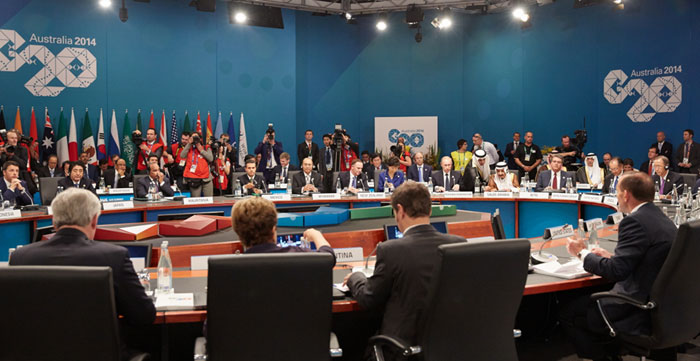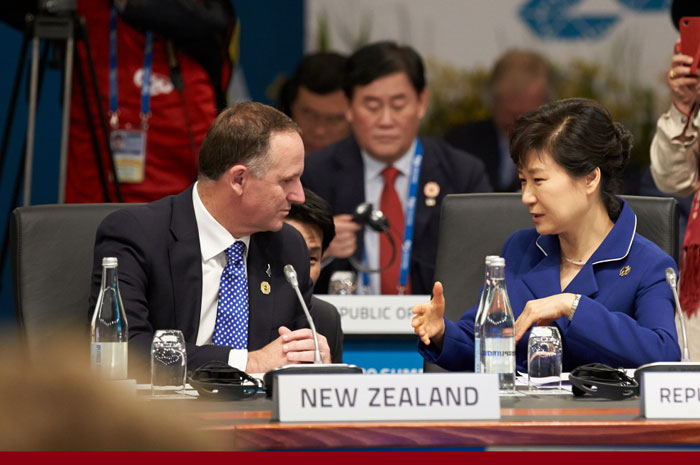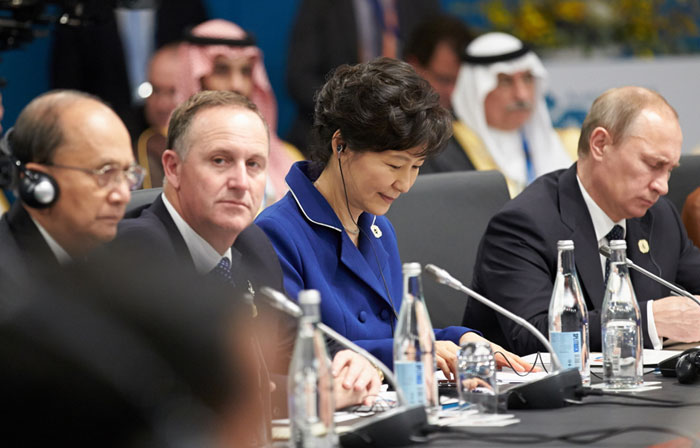An economic growth strategy based on the current administration's three-year economic innovation plan, the country's ongoing set of economic policy goals, has received the highest marks from G20 member countries.
The results are from a joint analysis conducted by the International Monetary Fund (IMF) and the Organisation for Economic Co-operation and Development (OECD), Deputy Prime Minister Choi Kyung Hwan announced on November 16. In the report, the IMF and OECD reviewed growth strategies from among the G20 economies.
The report predicted that Korea’s GDP would increase by 4.4 percent, or by KRW 60 trillion, to hit KRW 1,437 trillion by 2018 if the government's growth strategy goes according to plan. Otherwise, it would reach only about KRW 1,378 trillion in that year without the plan.



The joint analysis on growth strategies was conducted at the request of the G20. As growth has become an important issue in the world economy to overcome the global financial crisis, the G20 asked its member countries to submit structural reform plans in four sectors -- investment, trade, employment and competition -- in order to raise the GDP of all G20 countries by more than 2 percent by 2018. Each of the G20 countries submitted their growth strategy drafts in early May this year, and made their final version this past October after going through a cross-evaluation process between member countries and an interim evaluation by both the IMF and the OECD.
In the G20 Leaders’ Communiqué, leaders of the participating countries agreed to add the following phrase, “Our actions to boost growth and create quality jobs are set out in the Brisbane Action Plan and in our comprehensive growth strategies,” while vowing to carry out the comprehensive strategies without delay.
They further agreed to set up plans for a concrete implementation review and evaluation for the implementation of the growth strategies. In this regard, they agreed to monitor and hold each other to account for implementing the commitments and to verify actual progress toward the growth goals. To do so, they will use analysis by international organizations, evaluate GDP-boosting policies, review and find measures to minimize adverse ripple effects and pursue measures to strengthen cooperation among G20 finance, trade and employment ministers.
By Wi Tack-whan, Yoon Sojung
Korea.net Staff Writers
Photos: Cheong Wa Dae
whan23@korea.kr
The results are from a joint analysis conducted by the International Monetary Fund (IMF) and the Organisation for Economic Co-operation and Development (OECD), Deputy Prime Minister Choi Kyung Hwan announced on November 16. In the report, the IMF and OECD reviewed growth strategies from among the G20 economies.
The report predicted that Korea’s GDP would increase by 4.4 percent, or by KRW 60 trillion, to hit KRW 1,437 trillion by 2018 if the government's growth strategy goes according to plan. Otherwise, it would reach only about KRW 1,378 trillion in that year without the plan.



President Park Geun-hye attends the first session of the G20 summit in Brisbane, Australia, on November 15.
The joint analysis on growth strategies was conducted at the request of the G20. As growth has become an important issue in the world economy to overcome the global financial crisis, the G20 asked its member countries to submit structural reform plans in four sectors -- investment, trade, employment and competition -- in order to raise the GDP of all G20 countries by more than 2 percent by 2018. Each of the G20 countries submitted their growth strategy drafts in early May this year, and made their final version this past October after going through a cross-evaluation process between member countries and an interim evaluation by both the IMF and the OECD.
In the G20 Leaders’ Communiqué, leaders of the participating countries agreed to add the following phrase, “Our actions to boost growth and create quality jobs are set out in the Brisbane Action Plan and in our comprehensive growth strategies,” while vowing to carry out the comprehensive strategies without delay.
They further agreed to set up plans for a concrete implementation review and evaluation for the implementation of the growth strategies. In this regard, they agreed to monitor and hold each other to account for implementing the commitments and to verify actual progress toward the growth goals. To do so, they will use analysis by international organizations, evaluate GDP-boosting policies, review and find measures to minimize adverse ripple effects and pursue measures to strengthen cooperation among G20 finance, trade and employment ministers.
By Wi Tack-whan, Yoon Sojung
Korea.net Staff Writers
Photos: Cheong Wa Dae
whan23@korea.kr